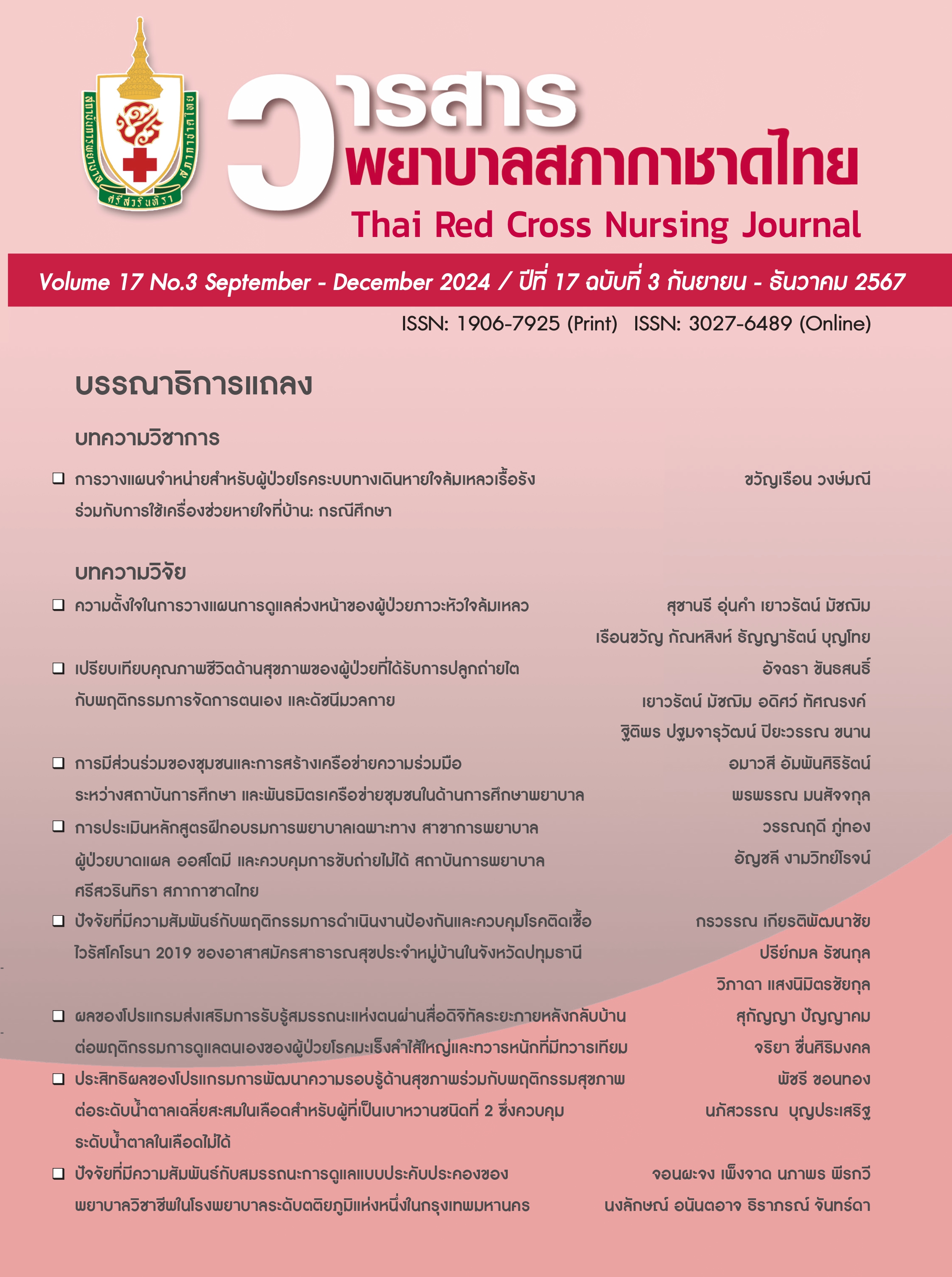ปัจจัยที่มีความสัมพันธ์กับสมรรถนะการดูแลแบบประคับประคอง ของพยาบาลวิชาชีพในโรงพยาบาลระดับตติยภูมิแห่งหนึ่งในกรุงเทพมหานคร
คำสำคัญ:
ความรู้, ทัศนคติ, พฤติกรรมการดูแลผู้ป่วยระยะท้าย, สมรรถนะการดูแลแบบประคับประคองบทคัดย่อ
การวิจัยเชิงพรรณนาแบบภาคตัดขวางนี้มีวัตถุประสงค์ เพื่อศึกษาสมรรถนะการดูแลแบบประคับประคองของพยาบาลวิชาชีพและปัจจัยที่มีความสัมพันธ์ ได้แก่ อายุ ระยะเวลาการทำงาน ความรู้ ทัศนคติเกี่ยวกับการดูแลผู้ป่วยแบบประคับประคอง และพฤติกรรมการดูแลผู้ป่วยระยะท้าย กลุ่มตัวอย่างเป็นพยาบาลวิชาชีพในโรงพยาบาลระดับตติยภูมิแห่งหนึ่งในกรุงเทพมหานคร จำนวน 322 คน คัดเลือกแบบเฉพาะเจาะจงตามเกณฑ์ เครื่องมือที่ใช้ในการเก็บรวบรวมข้อมูล ประกอบด้วย แบบบันทึกข้อมูลส่วนบุคคล แบบประเมินความรู้การดูแลผู้ป่วยแบบประคับประคอง แบบประเมินทัศนคติเกี่ยวกับการดูแลแบบประคับประคอง แบบสอบถามพฤติกรรมการดูแลผู้ป่วยระยะท้าย และแบบประเมินสมรรถนะการดูแลแบบประคับประคอง ซึ่งผ่านการตรวจสอบคุณภาพมีค่าความตรงเชิงเนื้อหา เท่ากับ 1, 1, 1, และ .95 ตามลำดับ และค่าสัมประสิทธิ์อัลฟาครอนบาค เท่ากับ .71, .81, .97, และ .98 ตามลำดับ วิเคราะห์ข้อมูลด้วยสถิติพรรณนา สถิติสัมประสิทธิ์สหสัมพันธ์ของเพียร์สันและเสปียร์แมน กำหนดระดับนัยสำคัญทางสถิติที่ p-value < .05
ผลการวิจัยพบว่า สมรรถนะในการดูแลแบบประคับประคองโดยรวมอยู่ในระดับปานกลาง (Mean = 185.74, SD = 41.53) ปัจจัยด้าน อายุ ระยะเวลาการทำงาน ทัศนคติ และพฤติกรรมการดูแลผู้ป่วยระยะท้าย มีความสัมพันธ์ทางบวกกับสมรรถนะการดูแลแบบประคับประคองอย่างมีนัยสำคัญทางสถิติ (rsp = .153, rsp = .147, r = .372, r = .684, p <. 05 ตามลำดับ) ในขณะที่ความรู้เกี่ยวกับการดูแลแบบประคับประคองไม่มีความสัมพันธ์อย่างมีนัยสำคัญทางสถิติ (r = .086, p > .05)
ผลการศึกษาครั้งนี้แสดงให้เห็นถึงความสำคัญของการเสริมสร้างทักษะปฏิบัติงานจริงและการส่งเสริมทัศนคติที่ดีต่อการดูแลแบบประคับประคอง เพื่อเพิ่มสมรรถนะในการดูแลผู้ป่วยแบบประคับประคองของพยาบาลวิชาชีพ
เอกสารอ้างอิง
World Health Organization. Assessing the development of palliative care worldwide: a set of actionable indicators. Geneva: World Health Organization; 2021.
Pairojkul S, Thongkhumcharoen R, Raksasattaya A, Sorasit C, Nakawiro P, Sudsa S, et al. Integration of specialist palliative care into tertiary hospitals: a multicenter point prevalence survey from Thailand. Palliat Med Rep 2021;2(1):272-9.
World Health Organization. National cancer control program: policies and managerial guidelines. 2nd ed. Geneva; World Health Organization. 2002.
Junda J, Phengjard J, Sumdangrit B, Patumwan A, Chaiviboontham S, Intarasombat P, et.al. Palliative care system: central region of Thailand. TRC Nurs J 2017;10(2):87-102. (in Thai)
Thailand Nursing and Midwifery Council. Palliative nurse specialist competencies. Bangkok: Health Service Executive; 2014. (in Thai)
Jamjan L, Chaleoykitti S. Trend of palliative care in the bachelor of nursing science curriculum. Journal of The Royal Thai Army Nurse 2017;18(1):22-8. (in Thai)
Akarathanarak T, Kongsuwan W, Matchim Y. New registered nurse knowledge in caring for patients at the end of life. Journal of Research in Nursing-Midwifery and Health Sciences 2014;34(2):103-16. (in Thai)
Hanprasitkam K, Patoomwan A, Churaitatsanee S, Paisansuthideth U. The effect of an end-of-life care education program on nurses’ knowledge, attitude, and practice in caring for end-of-life patients. Rama Nurs J 2011;17(1):126-39. (in Thai)
Österlind J, Prahl C, Westin L, Strang S, Bergh I, Henoch I, et al. Nursing students' perceptions of caring for dying people, after one year in nursing school. Nurse Educ Today 2016;41:12-6.
Srisuwan N, Matchim Y, Nilmanat K. Nurses’ competency in communication with patients at the end of life and their families and related factors. Songklanakalin Journal of Nursing 2014;34(3):109-24. (in Thai)
Danphathong A. Nurses’ caring behavior for terminally ill patients as perceived by professional nurse of Phrae hospital. Journal of Nursing Division 2009;36(1):15-26. (in Thai)
Nupinit W. Nilmanat K, Mutchim Y. Selective factors related to intensive care units’ registered nurses’ competency in caring for terminally ill patients. Thai Journal of Nursing Council 2017;32(4):94-106. (in Thai)
Satsin T, Matchim Y, Thongthawee B. Emergency nurses’ competency in the provision of palliative care and related factors. Songklanagarind Journal of Nursing 2017;37(Suppl):41-50.
Montagnini M, Smith H, Balistrieri, T. Assessment of self-perceived end-of-life care competencies of intensive care unit providers. J Palliat Med 2012;15(1):29-36.
Lee, H, Seo, K. Mediating effect of compassion competence on the relationship between caring behaviors and quality of nursing services in South Korea. Healthcare 2022;10(5):964.
Yamane T. Taro statistic: an introductory analysis. New York: Harper & Row; 1967.
City of Hope and Palliative Care Resource Center. The end of life knowledge assessment: RN End of Life Knowledge Assessment RN/LVN Version. Measurement Instrument Database for the Social Science [database on the Internet]. 2010 [cited 2018 Feb 20]. Available from: https://www.cityofhope.org/sites/www/files/2022-06/1431763780314-instruments.pdf
Frommelt KH. Attitude toward care of the terminally ill: an educational intervention. Am J Hosp Palliat Care 2003;20(1):13-22.
Prompahakul C, Nilmanat K., Kongsuwan W. Nurses’ caring behaviors for dying patients in Southern Thailand. Nurse Media Journal of Nursing 2011;1(2):147-58.
Loknimith W. Self-perceiving in palliative care competencies of professional nurse after receiving bachelor’s degree less than two years in a university hospital [Thesis]. Bangkok: Mahidol University; 2018.
Kim HY. Statistical notes for clinical researchers: assessing normal distribution (2) using skewness and kurtosis. Restor Dent Endod 2013;38(1):52-4.
Chanaphon P, Junda T, Hanprasitkam K. Perception on palliative care competencies among professional nurses at beginner’s level in a tertiary hospital under the jurisdiction of the ministry of public health. Journal of Nursing and Health Care 2020;38(3):61-9. (in Thai)
Piyawattanapon S, Phutthikhamin N, Sangchar B, Sangchar B, Panpanit L, Tangvoraphonkchai J, Kongtaln O, et. Al. Perceived competency of palliative care nursing among the professional nurses who completed short course training in palliative care nursing at Faculty of Nursing, Khon Kaen University. Journal of Nursing Science & Health 2023;46(1):34-48. (in Thai)
Nupinit W. Relationship between selected factors intensive and ICU nurses’ competency for caring of patients at the end of life [Thesis]. Songkla: Prince of Songkla University; 2016. (in Thai)
Geawhan P, Srichantaranit A, Sanasuttipun A. Factors Related to Nurses’ Competency in communication with pediatric patients at the end of life and their families. Nurs Sci J Thail 2019;37(1):32-44. (in Thai)
ดาวน์โหลด
เผยแพร่แล้ว
ฉบับ
ประเภทบทความ
สัญญาอนุญาต
ลิขสิทธิ์ (c) 2024 สถาบันการพยาบาลศรีสวรินทิรา สภากาชาดไทย

อนุญาตภายใต้เงื่อนไข Creative Commons Attribution-NonCommercial-NoDerivatives 4.0 International License.
เนื้อหาบทความหรือข้อคิดเห็นต่างๆ ในวารสารพยาบาลสภากาชาดไทยนี้ เป็นความคิดเห็นของผู้เขียนบทความ ไม่ใช่ความเห็นของกองบรรณาธิการ หรือสถาบันการพยาบาลศรีสวรินทิรา สภากาชาดไทย






